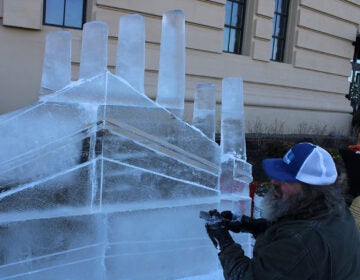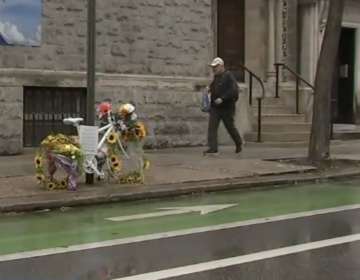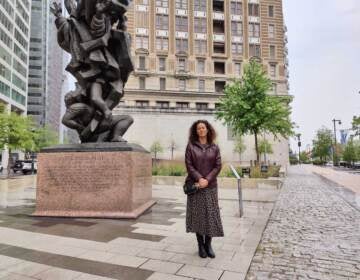Philadelphia’s Holocaust memorial, America’s oldest, gets a facelift
A new plaza was constructed to provide a better backdrop for the memorial and more information about Nazi Germany's atrocities.
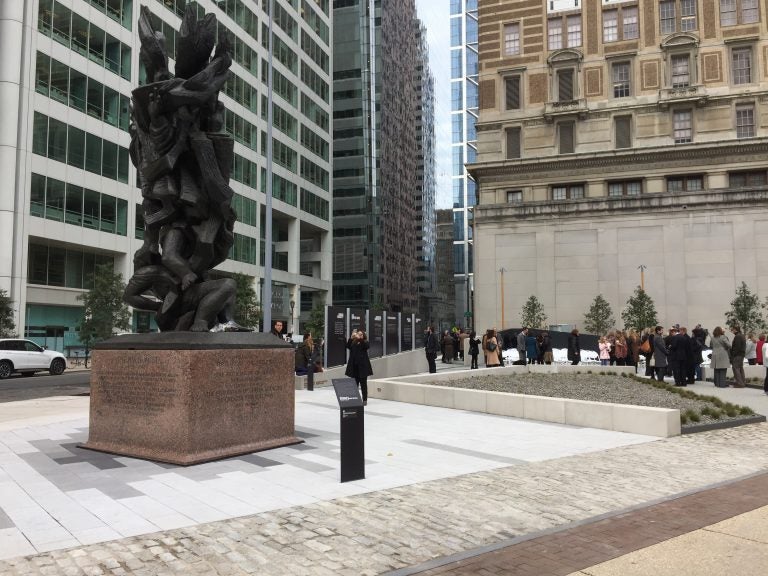
The plaza at 16th Street and Benjamin Franklin Parkway in Center City Philadelphia surrounds a bronze statue installed in 1964. The statue is America’s oldest public Holocaust memorial. (Avi Wolfman-Arent/WHYY)
The numbers inked into Itka Zygmuntowicz’s left forearm have started to warp and fade.
It’s now been 70 years since World War II ended and Zygmuntowicz left the Auschwitz concentration camp. Since 1970, she’s spoken about her experiences there in an effort to remind the world of Nazi Germany’s atrocities.
She knows, though, that memories, like tattoos, can blur with age. That doesn’t mean you stop trying to remember.
“We don’t know how much it gonna help, but we have to try,” Zygmuntowicz said Monday, standing on the hard stone of a new plaza she hopes will aid the effort.
The plaza at 16th Street and Benjamin Franklin Parkway in Center City Philadelphia surrounds a bronze statue installed in 1964. That statue — a towering braid of faceless limbs — is America’s oldest public Holocaust memorial.
-
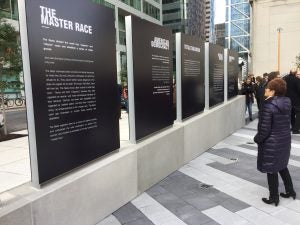
A passer-by stops to read one of the six inscribed pillars — half connected to Nazi aims and half connected to American ideals — that are part of Philadelphia’s updated Holocaust memorial. (Avi Wolfman-Arent/WHYY)
For years it stood alone, surrounded by a grassy median.
On Monday, officials unveiled a new memorial plaza meant to enhance the site’s appeal. It includes six inscribed pillars — half connected to Nazi aims and half connected to American ideals. A digital flame plays perpetually in the back corner, and saplings dot the tiered, stone landscape.
One of those saplings comes from the seed of a maple planted by children at the Theresienstadt concentration camp. Visitors will also find sections of train track from the Treblinka camp embedded in the stone.
An app produced by the University of Southern California’s Shoah Foundation offers a digital tour of the new space, which is sandwiched between the Parkway and Arch Street.
The memorial’s creators hope the app, which features videos, will “capture the spirit” of living Holocaust survivors, said David Adelman, board chair of the Philadelphia Holocaust Remembrance Foundation.
When the last generation of survivors does pass, the memorial will stand as a permanent reminder. Officials, backers, and everyday Philadelphians filled the plaza Monday to support its birth.
“This is my city. I love my city,” said Philadelphian Marie Jackson “And whenever it recognizes something of this importance, I wanna be part of it.”
WHYY is your source for fact-based, in-depth journalism and information. As a nonprofit organization, we rely on financial support from readers like you. Please give today.



